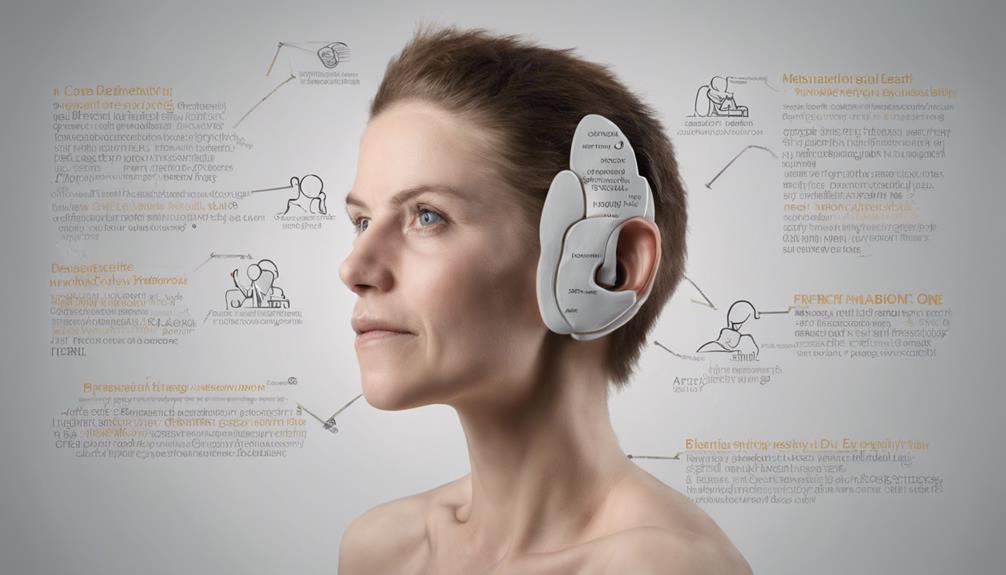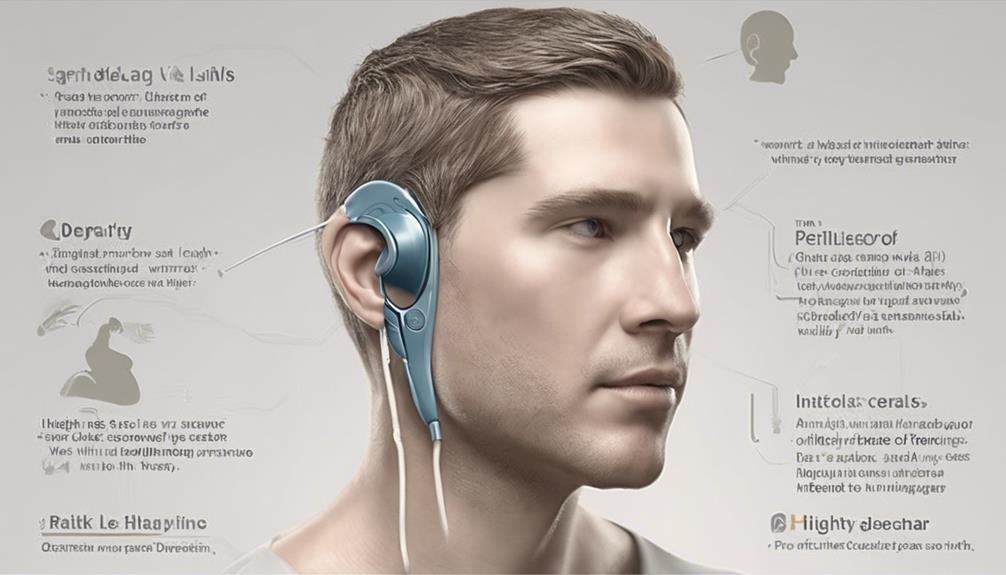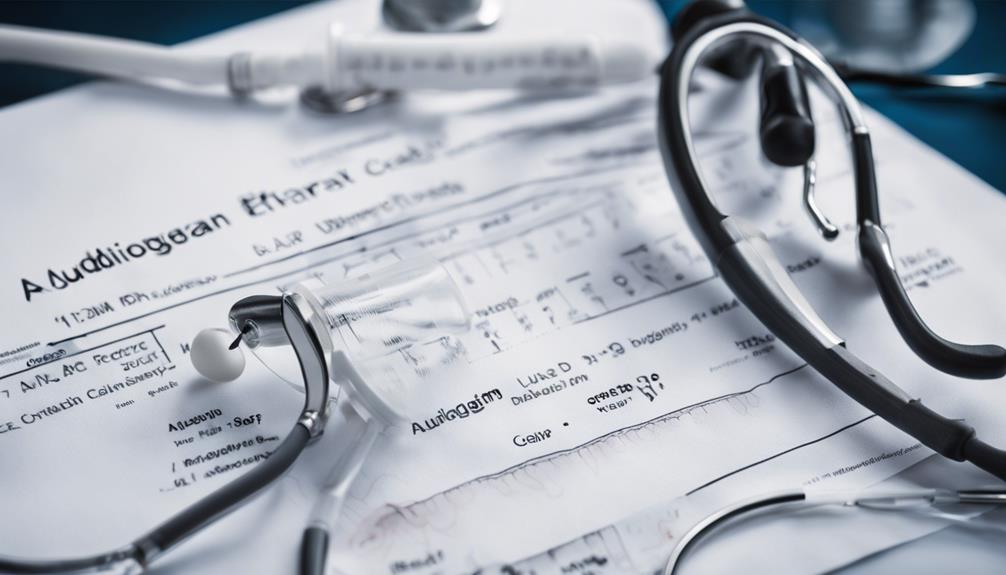Navigating through the world of disability benefits for unilateral deafness can feel like exploring a complicated maze with its own set of rules and criteria.
The intricacies of qualifying for support when experiencing deafness in one ear can be puzzling, but fear not, for we are here to shed light on this matter.
From understanding the eligibility requirements to the application process and the impact on daily life, there are crucial aspects to explore in this realm.
So, let's unravel the layers of how being deaf in one ear can potentially shape your journey towards securing necessary assistance.
Key Takeaways
- Meeting specific criteria for profound hearing loss in one ear is crucial.
- Documenting functional limitations on daily activities and work performance is essential.
- Seeking legal guidance can help navigate the application process effectively.
- Demonstrating the impact of deafness on quality of life increases chances of approval.
Understanding Disability Benefits for Unilateral Deafness
Understanding the criteria for disability benefits related to unilateral deafness is crucial for individuals seeking financial support for their condition. When it comes to qualifying for disability benefits due to deafness in one ear, meeting specific requirements for profound hearing loss in that ear is paramount. The SSA Listing for hearing outlines the thresholds for profound hearing loss that make individuals eligible for benefits. It's important to note that even individuals with good hearing in one ear may still qualify for disability benefits based on the impact unilateral deafness has on their daily life and work.
Documenting the severity and functional impact of unilateral deafness is essential for a successful disability claim approval. Providing detailed evidence of how deafness in one ear hinders communication, job performance, and overall quality of life strengthens the case for benefit eligibility. Seeking legal guidance during the application process can help navigate the complexities of proving the extent of the disability and increase the chances of a successful claim.
Eligibility Criteria for Deafness in One Ear

When determining eligibility for disability benefits due to deafness in one ear, it's crucial to meet Social Security's requirements by providing detailed medical evidence of profound hearing loss. Documenting the impact of limited functional capacity resulting from one-sided deafness is essential for qualification.
Even individuals with partial hearing in one ear may be eligible if they can demonstrate significant limitations affecting their daily activities and work performance.
One-Sided Deafness Criteria
Individuals with one-sided deafness may qualify for disability benefits based on specific eligibility criteria related to the impairment of hearing in one ear. When assessing eligibility for disability benefits due to one-sided deafness, the Social Security Administration (SSA) considers the following criteria:
- Functional Limitations: The impact of hearing loss in one ear on an individual's ability to effectively communicate and function in work settings.
- Severity of Impairment: Meeting the SSA's listing of impairments for hearing loss in one ear, which requires demonstrating the inability to carry out daily activities and job tasks effectively.
- Daily Life and Job Performance: Individuals with severe hearing loss in one ear may be eligible for disability benefits based on the significant impact on their daily activities and job performance.
Hearing Loss Documentation
Hearing loss documentation required for disability benefits necessitates audiometric testing conducted by a licensed audiologist to determine eligibility criteria for deafness in one ear. Specific tests like word recognition tests are essential to showcase the severity of hearing loss. The Social Security Administration (SSA) may request medical evidence from an otolaryngologist and additional tests to support the disability claim. Cochlear implantation is a factor considered during disability determination for individuals experiencing hearing loss. Meeting the official SSA listing criteria for hearing loss requires specific tests and documentation to establish eligibility.
| Audiometric Testing | Word Recognition Test |
|---|---|
| Determines hearing levels | Assesses ability to understand speech |
| Conducted by audiologist | Crucial for demonstrating severity of hearing loss |
Application Process for Disability Benefits
Gathering comprehensive medical records that support the claim is a crucial initial step in the application process for disability benefits due to being deaf in one ear. When applying for disability benefits, attention to detail is key. Here are essential steps to follow:
- Accurate Application Completion: Ensure the disability benefits application is filled out accurately and thoroughly. Any missing information could delay or hinder the approval process.
- Consultation with Healthcare Providers: Seek documentation from healthcare providers that clearly outlines the extent of your hearing loss. Detailed medical records can significantly strengthen your disability benefits application.
- Legal Assistance: Consider seeking legal assistance to navigate the complexities of the application process. Legal professionals can offer guidance on what documentation is necessary and can help ensure that the application is correctly filled out.
Impact of Unilateral Deafness on Daily Life

Navigating daily activities can pose significant challenges for individuals with unilateral deafness, impacting spatial awareness and communication abilities in various settings. Unilateral deafness can lead to difficulties in accurately determining the source and distance of sounds, affecting the ability to localize sounds and maintain spatial awareness.
In noisy environments, individuals with deafness in one ear may struggle to filter out background noise, making it challenging to focus on specific sounds and conversations. Communication challenges are also prevalent, especially in group settings where following conversations can be arduous.
Tasks like driving, crossing the street, and participating in team sports may require extra caution and attention for individuals with unilateral deafness due to limitations in auditory information. The emotional effects of unilateral deafness can include feelings of isolation and frustration in social interactions, highlighting the need for support systems that address both the practical and emotional aspects of living with this condition.
Support Available for Individuals With Hearing Loss

We can explore the various support options available for individuals experiencing hearing loss, particularly those with unilateral deafness.
- Social Security Disability Insurance (SSDI):
SSDI may provide essential support for individuals with profound hearing loss in one ear. Qualifying for SSDI benefits requires meeting specific eligibility criteria, including audiometry tests to assess the severity of the hearing loss.
- Legal Assistance:
Seeking legal assistance can be crucial in navigating the application process for disability benefits related to hearing loss. Legal professionals can provide guidance on the necessary documentation and ensure that all requirements are met for a successful claim.
- Disability Benefits:
Individuals seeking benefits for deafness in one ear must demonstrate how it significantly impacts their ability to work and engage in daily activities. Properly documenting the effects of unilateral deafness is essential for approval and receiving the necessary support.
Cochlear Implant Considerations for Disability

Individuals with unilateral deafness may find that cochlear implants play a pivotal role in determining their eligibility for disability benefits. Cochlear implants can indicate profound hearing loss, which is a key factor in supporting a claim for disability benefits.
The Social Security Administration considers cochlear implantation as part of the eligibility criteria for disability benefits. In some cases, meeting specific criteria with cochlear implants can lead to automatic approval for these benefits.
After cochlear implantation, individuals may qualify for disability benefits for a year. However, to continue receiving benefits beyond the initial year, additional impairments may need to be present to meet the eligibility criteria.
Understanding the role of cochlear implants in the context of disability benefits is crucial for individuals with unilateral deafness seeking financial support. The decision to pursue cochlear implants not only impacts their hearing health but also their potential eligibility for disability benefits.
Medical Evidence Required for Deafness Claims

When establishing deafness claims, the medical evidence required typically involves audiometric testing conducted by a licensed audiologist. To support a deafness claim effectively, the following steps are crucial:
- Audiometric Testing: This initial testing assesses the extent of hearing loss and is a fundamental component in providing evidence for a deafness claim.
- Otolaryngologist Examination: A physical examination by an otolaryngologist is essential to evaluate the severity of the hearing impairment and determine its impact on daily functioning.
- Auditory Evoked Response Testing: In certain cases, auditory evoked response testing may be necessary to provide comprehensive evidence supporting the deafness claim.
Meeting the Social Security Administration's listing for deafness requires a meticulous approach to gathering medical evidence. This includes adherence to specific tests and documentation standards outlined in the SSA listing for deafness.
Meeting the SSA Listing for Unilateral Deafness

When aiming to meet the SSA listing for unilateral deafness, it's essential to focus on the specific criteria outlined by the Social Security Administration.
Gathering comprehensive medical evidence that showcases the extent of limitations caused by unilateral deafness is crucial for a successful disability claim.
Understanding the requirements and ensuring that the evidence presented aligns with the SSA criteria is fundamental in pursuing disability benefits for unilateral deafness.
SSA Listing Criteria
Meeting the SSA listing for unilateral deafness necessitates a pure-tone average of 90 decibels or higher in the better ear. When evaluating unilateral deafness for disability benefits, the SSA considers various factors to determine eligibility.
Here are key points to understand regarding the SSA listing criteria for unilateral deafness:
- Pure-Tone Average Requirement: A pure-tone average of 90 decibels or higher in the better ear is necessary to meet the SSA listing criteria for unilateral deafness.
- Speech Discrimination Scores: Individuals with deafness in one ear may also qualify if their speech discrimination scores fall below a specific threshold.
- Impact Assessment: The impact of unilateral deafness on daily activities and communication abilities is carefully assessed by the SSA to determine eligibility for disability benefits.
Medical Evidence Required
To establish eligibility for disability benefits due to unilateral deafness, comprehensive medical evidence, including audiometric testing conducted by a licensed audiologist, is essential. Specific tests such as pure-tone audiometry and speech discrimination testing play a crucial role in documenting the extent of hearing loss in one ear. Additionally, auditory evoked response testing may be necessary to provide further support for the claim of unilateral deafness.
Meeting the official SSA listing criteria for unilateral deafness requires demonstrating not only significant hearing loss but also the functional limitations it imposes. Therefore, a detailed medical report outlining the impact of unilateral deafness on daily activities and work is vital for the approval of disability benefits. This evidence is indispensable in showcasing the severity of unilateral deafness and its effects on an individual's life.
Functional Capacity Assessment for Hearing Loss

Functional capacity assessments for hearing loss involve analyzing an individual's ability to engage in daily activities and work tasks, determining the impact of hearing impairment on various functions. When conducting these assessments, several key points are considered:
- Residual Functional Capacity: This rating is crucial and is determined based on the severity of the hearing impairment and its associated limitations. It reflects the individual's remaining ability to function in a work environment.
- Work Restrictions: Based on the results of the functional capacity assessment, specific work restrictions may be recommended to accommodate the individual's hearing impairment and ensure a safe and productive work environment.
- Job Availability Evaluations: These evaluations take into account the individual's residual functional capacity, along with factors such as age, education, and work experience, to assess the types of jobs that may be suitable for the individual given their hearing impairment.
Importance of Using Qualified Interpreters

Using qualified interpreters is essential to ensure accurate and effective communication during the disability application process. Interpreter certification plays a critical role in guaranteeing the quality of interpretation provided to deaf or hard of hearing individuals.
Understanding communication access rights and the importance of high-quality interpretation is fundamental in accurately conveying the impact of hearing loss on daily life and work functions.
Interpreter Certification Importance
Ensuring certification of interpreters is paramount to guaranteeing accurate and effective communication for individuals with hearing impairments during disability claim processes.
Importance of Interpreter Certification:
- Proficiency in Sign Language: Certified interpreters possess advanced skills in sign language, ensuring precise translation of information.
- Understanding of Deaf Culture: Certification includes knowledge of deaf culture, enhancing the interpreter's ability to convey nuances effectively.
- Legal and Medical Expertise: Certified interpreters are trained to handle complex legal and medical terminology, aiding in accurate communication during disability claim proceedings.
Certified interpreters play a crucial role in bridging communication gaps for individuals with hearing loss, ensuring fair treatment and access to disability benefits from organizations like the Social Security Administration.
Communication Access Rights
Deaf or hard of hearing individuals have the right to demand a qualified sign language interpreter to ensure effective communication. Utilizing a qualified interpreter is crucial for accurately conveying information, especially during the disability benefits application process. Sign language interpreters provided by Social Security enable equal access to services for all applicants, ensuring deaf individuals receive the same opportunities as hearing applicants. Clearly articulating how hearing loss impacts daily life outside of work is vital when initiating a disability claim. By advocating for communication access rights, individuals with hearing loss can navigate the application process more effectively and secure the benefits they deserve.
| Communication Access Rights | Importance |
|---|---|
| Qualified Sign Language Interpreter | Ensures effective communication |
| Social Security Services | Offer free interpreters for equal access |
| Accuracy | Vital during benefits application |
| Equal Opportunities | Deaf and hearing applicants |
| Articulation of Hearing Loss Impact | Crucial for disability claims |
Quality of Interpretation
Transitioning from the discussion on Communication Access Rights, we emphasize the critical role of utilizing qualified interpreters to ensure accurate communication in disability claims involving individuals with hearing loss.
- Qualified Interpreters Ensure Accuracy: Using a qualified interpreter is crucial for conveying information accurately between the applicant and the Social Security Administration.
- Full Participation: Qualified interpreters guarantee that individuals with hearing loss can actively participate in the application process, securing their right to equal treatment.
- Right to Access: Access to a qualified sign language interpreter is a fundamental right for individuals who are deaf or hard of hearing, ensuring they receive fair consideration during the disability benefits application process.
Sign Language Skills for Disability Claims

Mastering sign language can significantly enhance the effectiveness of disability claims filed in relation to deafness in one ear. When individuals possess strong sign language skills, they can effectively navigate communication barriers caused by their hearing impairment. By showcasing proficiency in sign language, claimants provide concrete examples of the functional limitations they experience due to their deafness in one ear. Sign language fluency serves as a powerful tool in illustrating the impact of hearing loss on daily interactions, highlighting the challenges faced in various settings.
In the context of disability claims, the ability to communicate through sign language not only demonstrates the severity of the impairment but also showcases the efforts made to overcome obstacles. Utilizing sign language in these claims adds a layer of authenticity and clarity, allowing adjudicators to grasp the full extent of the communication barriers faced by individuals with unilateral deafness. Overall, incorporating sign language skills into disability claims can significantly strengthen the case presented and provide a more comprehensive understanding of the claimant's situation.
Starting a Disability Claim for Unilateral Deafness

When initiating a disability claim for unilateral deafness, it's essential to gather comprehensive medical evidence that clearly delineates the severity and functional impact of the hearing impairment on daily activities and occupational performance.
Here are three key steps to consider:
- Document Hearing Loss: Provide detailed medical records, including audiograms and assessments from healthcare professionals, to demonstrate the extent of hearing loss in one ear.
- Describe Functional Limitations: Clearly articulate how unilateral deafness affects communication, spatial awareness, and overall job performance to strengthen your case for disability benefits.
- Meet SSA Criteria: Ensure that your medical evidence aligns with the Social Security Administration's guidelines for unilateral deafness to facilitate a smoother approval process for disability benefits.
Securing Deserved Compensation for Hearing Loss

Securing deserved compensation for hearing loss requires thorough documentation of the functional limitations caused by deafness in one ear and meeting specific medical criteria essential for eligibility. Individuals seeking disability benefits due to deafness in one ear must demonstrate the significant impact on their ability to work and perform daily activities.
The severity and consequences of hearing loss in one ear play a crucial role in determining eligibility for disability compensation. Detailed documentation outlining how deafness in one ear affects communication, spatial awareness, and overall quality of life is vital in the application process. Providing evidence of these functional limitations is key to justifying the need for disability support.
Seeking legal guidance can help navigate the complexities of the application process and increase the chances of securing the deserved compensation for hearing loss in one ear. By following the necessary steps and meeting the specific medical criteria, individuals can enhance their prospects of receiving the disability benefits they're entitled to.
Frequently Asked Questions
Is Being Deaf in 1 Ear a Disability?
Being deaf in one ear can indeed qualify as a disability, depending on its impact on daily life and work. The Social Security Administration considers unilateral deafness as a disabling condition, requiring documentation of severity and functional limitations for approval.
Meeting specific medical criteria is crucial for eligibility. It's essential to demonstrate how deafness in one ear significantly impairs one's ability to function in various aspects of life to qualify for disability benefits.
Can You Claim Disability for Being Deaf in One Ear?
Yes, we can claim disability for being deaf in one ear if it significantly impairs daily function and work. Severity and impact are vital considerations for qualification. Meeting SSA criteria for hearing loss is key.
Documenting how single-sided deafness affects communication and work tasks strengthens claims. Seeking medical evaluation and supporting evidence are crucial.
Eligibility hinges on the condition's impact on daily life and ability to work.
What Is a Disability With No Hearing in One Ear?
Having no hearing in one ear can be deemed a disability if it significantly impacts daily life and work capabilities. Unilateral deafness poses challenges in spatial awareness, communication, and hearing in noisy environments. It affects balance, sound localization, and directional hearing.
This condition can qualify as a disability due to its impact on work performance and social interactions. Seeking medical evaluation is crucial for determining disability eligibility based on unilateral deafness.
What Happens if You Are Deaf in One Ear?
Being deaf in one ear can impact daily life in various ways. Communication challenges, difficulty localizing sounds, and potential safety issues are common.
Understanding speech in noisy environments might be problematic. Seeking medical advice and potential accommodations can help manage these difficulties.
Collaboration with healthcare providers and utilizing assistive devices can improve quality of life for those experiencing deafness in one ear.
Can a Person with Unilateral Deafness Qualify for Disability Benefits?
Yes, a person with unilateral deafness may qualify for disability benefits, depending on the severity of their condition and how it impacts their ability to work. Some people with unilateral deafness may experience challenges in certain professional settings, such as deaf gynecologist examinations techniques.
Can Deafness in One Ear Impact a Lawyer’s Ability to Practice Law?
Yes, deaf lawyers in the legal field can face challenges related to their ability to hear crucial information during court proceedings and client interactions. However, accommodations such as visual aids and assistive technology can help mitigate the impact of deafness in one ear on a lawyer’s ability to practice law effectively.
Conclusion
In conclusion, navigating the process of obtaining disability benefits for unilateral deafness requires meticulous attention to medical evidence and documentation.
Like a skilled navigator charting a course through turbulent waters, individuals must advocate for themselves and seek the support they need to secure the compensation they deserve.
By following the proper steps and utilizing available resources, individuals with hearing loss can access the assistance they need to improve their quality of life.











